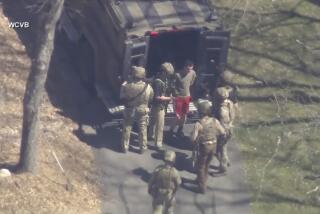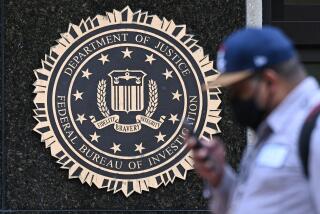Closer U.S. Role Seen on Bosnia-Iran Arms Pipeline
- Share via
WASHINGTON — When Peter Galbraith, the U.S. ambassador to Croatia, sat down in a Zagreb mosque in the spring of 1994 with Imam Sevko Omerbasic, the religious leader of Zagreb’s small Muslim community, they talked of their shared passion: the plight of the besieged Muslims in neighboring Bosnia.
Galbraith, who was accompanied by an embassy aide, later described the meeting as a courtesy call “over tea cakes and Fantas.”
But Omerbasic claimed that the meeting was much more. On April 16, 1994, according to an account obtained by U.S. intelligence, Omerbasic told the Iranian ambassador to Croatia that two U.S. officials had encouraged him to acquire arms for the Bosnian Muslims by any available means.
The nature of Galbraith’s relationship with Omerbasic--never before publicly revealed--is one of several issues that lie at the heart of the controversy over President Clinton’s secret decision to give a green light to covert shipments of Iranian arms to Bosnia-Herzegovina in 1994.
Administration officials repeatedly have denied that they violated any U.S. laws in the initiative, which came at a time when the United States was pledged to uphold a United Nations arms embargo on the war-torn nation.
They have insisted that the administration merely turned a blind eye to the Iranian smuggling and have denied that any American officials ever took an active role in facilitating it.
House and Senate investigations earlier this year reached different conclusions on whether the administration’s actions ever crossed the line into an improper covert operation. The select subcommittee created by the House to look into the matter said it believed there may have been an unauthorized covert action and asked the Justice Department to investigate its legality. The Senate Intelligence Committee issued a report critical of the administration’s policy but did not question its legality.
Examination of the policy, however, has been revived because of Clinton’s nomination of National Security Advisor Anthony Lake to be the nation’s next CIA director. Lake played a key role in the administration effort.
*
Meanwhile, hundreds of pages of classified documents obtained recently by The Times shed new light on the murky venture and indicate that administration officials came closer than previously known to aiding the flow of Iranian arms into the region.
In particular, the secret cables and depositions of key figures raise questions about whether Lake and other top policymakers kept a tight leash on Galbraith, a U.S. point man in the sensitive operation, as he walked the line between diplomacy and illegal covert action and between the desperate Bosnian state and America’s Iranian nemesis.
The Senate Intelligence Committee, which investigated the Iran-Bosnia matter, is expected to raise Lake’s central role in the arms initiative as an issue in his confirmation hearings early next year. Both Sen. Arlen Specter (R-Pa.), the outgoing chairman of the panel, and Sen. Richard C. Shelby (R-Ala.), the incoming chairman, have said that they are deeply troubled by Lake’s involvement, especially for keeping the policy secret from Congress for two years.
*
The issue has become of sufficient concern that Lake has privately begun contacting Senate leaders to say that he wishes he had told Congress about the arms initiative when it first emerged in 1994.
As Lake prepares for his questioning, the newly obtained classified documents provide the most vivid picture yet of Galbraith probing and maneuvering in Zagreb, the Croatian capital, while Lake and State Department officials oversaw the venture in Washington.
According to the new documents:
* Administration officials sought to coordinate American diplomatic actions to correspond with the Iranians’ timetable for creating a secret arms pipeline to Bosnia. At the time, the Muslims were pleading for weapons to fend off their Serbian enemies; the Iranians wanted to help and to gain more influence in Bosnia. And the United States sympathized with the Muslims’ plight.
“This matter is time-urgent,” Galbraith cabled the State Department on April 27, 1994, seeking the administration’s response to such a proposed smuggling effort. “Croatian Prime Minister [Nikica] Valentic will leave for Tehran on April 29. The Iranians have made clear that the only thing to be accepted on the trip is arrangements for the transshipment of arms.” Without a U.S. go-ahead, “this trip may be canceled.”
* Galbraith had details on how the arms pipeline would work before Clinton agreed to allow it to proceed unchallenged. Just before Clinton gave the nod, Galbraith relayed that the arms would arrive in “unmarked 747s” and that the Croatians would take a large cut.
* Lake and other senior administration officials took exceptional steps to keep the U.S. role secret. Samuel R. “Sandy” Berger, then deputy national security advisor and now Clinton’s choice to succeed Lake, upbraided NSC staffer Jenonne Walker for passing on a Galbraith request for written orders, according to her classified testimony. “Damn it, Jenonne! He is not going to get his instructions in writing, he has his instructions,” Berger told Walker.
* Galbraith hid his knowledge of the Iranian arms pipeline from a team of U.N. inspectors who came to Zagreb to investigate reports of Iranian arms smuggling.
At the time of the administration’s deliberations, there was widespread sympathy in Congress for the Muslims’ suffering in the Bosnian civil war. But the administration kept America’s indirect help secret to avoid inflaming the European allies, who were concerned that the Muslims’ Serb enemies would retaliate against international peacekeeping forces in the region, and to avert controversy over boosting Iran’s influence there.
*
Administration officials say they are convinced that Galbraith--who has had to testify repeatedly in both open and classified hearings--never broke the law or became actively involved in advancing the smuggling. Yet they acknowledge that this conclusion rests largely on his own account of his actions, which they accept but some in Congress do not.
The skeptics’ doubts are at the heart of the Justice Department request filed by the House select subcommittee on Iran-Bosnia. The Justice Department has not yet acted on the referral.
The son of famed economist John Kenneth Galbraith, Peter Galbraith was a longtime staff member on the Senate Foreign Relations Committee when he was appointed the first U.S. ambassador to the newly independent Croatia in 1993.
The plight of the Bosnian Muslims became a special cause for him, and he pressed for the Clinton administration to come to the Muslims’ aid in a way that the Bush administration had not.
According to CIA cables, Galbraith approached the CIA’s station chief in Zagreb in February or March 1994 to suggest that the United States could mount a covert action in which America would look the other way while Croatia allowed smuggled arms to cross through to neighboring Bosnia. Stunned at the suggestion, the CIA station chief reported the conversation to CIA headquarters.
*
Then in mid-April, the CIA obtained intelligence about Omerbasic’s conversation with the Iranian ambassador, in which the Zagreb cleric talked of getting U.S. encouragement for arms smuggling to Bosnia. The CIA began suspecting that Galbraith might be putting his own idea into action and using Omerbasic as a go-between with the Iranians.
In his testimony, Galbraith has acknowledged meeting with Omerbasic but denied talking about arms shipments with him, suggesting Omerbasic was lying to the Iranian ambassador. An embassy aide who attended the meeting has confirmed Galbraith’s version. CIA Director John M. Deutch says that the CIA also now believes Galbraith is telling the truth about his meeting.
But congressional investigators believe that Galbraith had more meetings with Omerbasic, who later helped mediate logistics for the pipeline. And the House subcommittee has made Galbraith’s veracity a key element in its criminal referral.
According to the classified documents, Galbraith’s former secretary, Charlotte Stottman, testified to the House panel that Galbraith met in his office with Omerbasic on more than one occasion. Galbraith has said they met only during the courtesy call at the mosque.
*
The next step, coming also in April 1994, is not in dispute: Galbraith reported to the State Department that he had gotten diplomatic signals that Croatia’s president, Franjo Tudjman, would soon seek Washington’s approval to begin secret arms smuggling to neighboring Bosnia.
Galbraith already had some details of how the pipeline would work, according to classified testimony by Alexander “Sandy” Vershbow, then deputy assistant secretary of State. Galbraith was “recommending that we encourage [it] in this very subtle way, and if we were to do that, that this is what would follow: that unmarked 747s would then arrive and the Croats would take half,” he said.
At about the same time, Galbraith told Washington that the U.S. position was crucial.
“Our views are likely to be decisive,” Galbraith wrote. Croatian officials “want to be sure they are acting in a way that meets with our approval. They will also want to be sure that we will not act or speak against them if they undertake the role of conduit,” he said in an April 27 cable.
He stressed that an early answer was imperative because of an impending visit to Tehran by Croatian Prime Minister Valentic, at which the arms pipeline was to be discussed.
“If it is canceled, the Muslims will likely understand that Croatia is not willing to be helpful in their hour of need with attendant consequences for future Muslim-Croatian cooperation,” he said.
Later that day, Clinton endorsed a plan crafted by Lake and Deputy Secretary of State Strobe Talbott to provide a response of “no instructions” to the Croatian proposal--a signal that the United States would not object.
Within days, Iranian flights began landing in Zagreb loaded with arms.
The arms shipments continued until January 1996, after U.S.-led peacekeeping troops arrived in Bosnia.
Inside the CIA, suspicions about Galbraith’s role in the smuggling operation were strong. But they grew in the fall of 1995, when problems with the arms operation developed and U.S. officials became involved.
According to the documents, Croatian Defense Minister Gojko Susak finally complained to the CIA station chief in Zagreb that the Iranian smuggling could no longer be tolerated.
But, according to a deposition by the station chief, Galbraith told the CIA official he “wasn’t to provide any support for the Croatian position that the arms flow should end.”
The station chief cabled CIA headquarters on Sept. 14, 1995, to report that “Galbraith has told [me] that it is the [U.S.] policy to do and say nothing to inhibit the flow of arms. Further, he has told [me] that it is the intent of this policy to facilitate the delivery of same.”
The station chief also said that Miro Tudjman, President Tudjman’s son and the chief of Croatian intelligence, later told him that Galbraith had intervened to free up a shipment of Iranian missiles that the Croatians had halted at the border, apparently over concerns about advanced weaponry going to the Bosnians. “Galbraith told us to release” them, the station chief said he was told.
Galbraith denies that he pressured the Croatians to send the missiles to Bosnia.
He counters that the CIA station chief filed inaccurate reports on his activities, and was, in effect, “spying” on his own ambassador. The CIA denies Galbraith’s charges.
More to Read
Sign up for Essential California
The most important California stories and recommendations in your inbox every morning.
You may occasionally receive promotional content from the Los Angeles Times.













